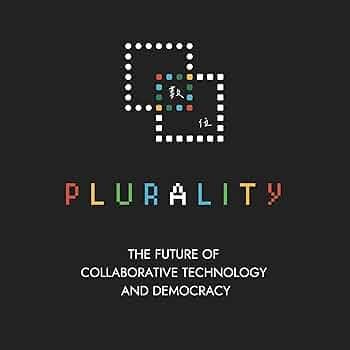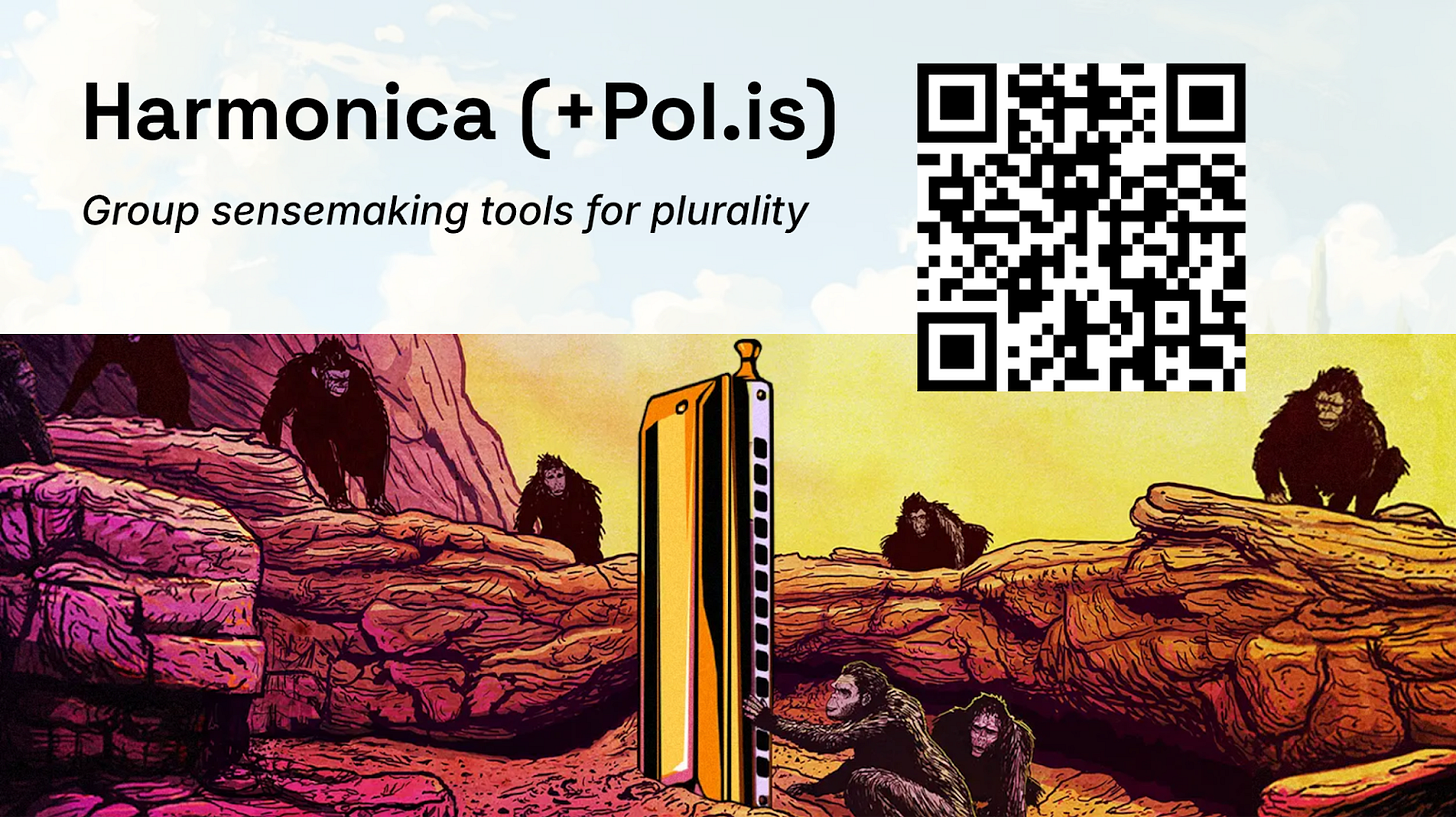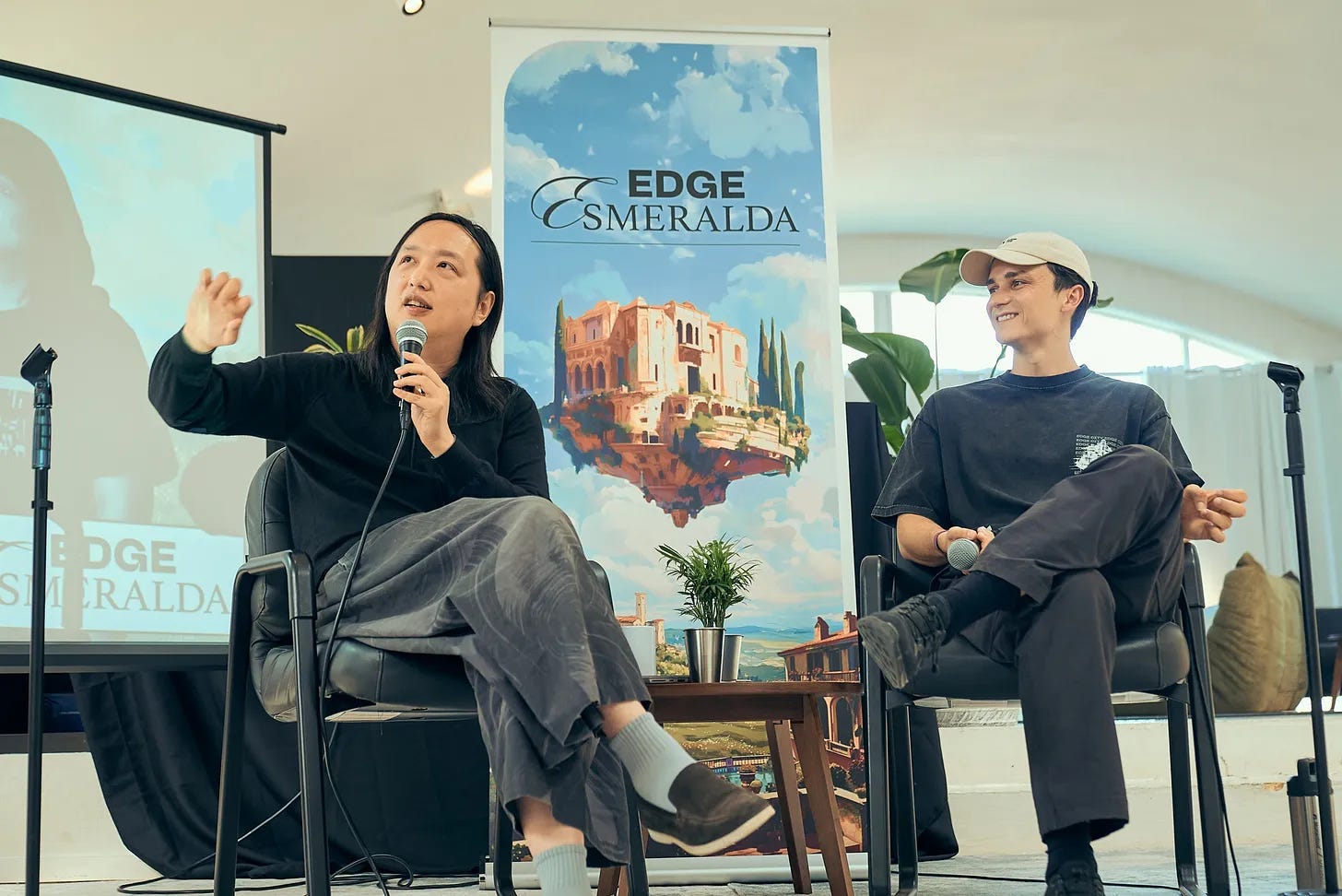A conversation with Audrey Tang
Upgrading democracy; turning conflict into productive energy; hacking polarization
Publish, then perish
When Audrey was young, doctors found a hole between the lower chambers of her heart. They gave her a 50% chance of surviving each night until a future surgery. Every evening, she recalls, she felt like she was flipping a coin to determine if she’d wake up. To soothe the existential stress, she began recording her thoughts each day; first on tape recorders and floppy disks, then bulletin boards and the early internet. She called this habit “publish, then perish,” a play on “publish or perish”. If she didn’t wake up, at least her ideas would survive.
This origin is key to Audrey’s philosophy. Today, she's known as Taiwan’s former Digital Minister and a leading advocate of digital democracy, but she remains an open-source civic hacker at (beating) heart. Her early experiences shaped her belief that ideas should be freely shared and continuously improved. Transparency, openness, and radical collaboration ensured her thoughts survived; now, she argues, they’re necessary to help democracy survive.
Last month, I spoke with Audrey at Edge Esmeralda 2025, a popup village in Northern California. We discussed digital democracy, her path from hacker to government minister, and the popup city movement. You can hear the full conversation here, or read the summary below.
Hacking the government: GovZero and the Sunflower Movement
In open-source software, if you want to improve a program, you can 'fork' it: copy the code and build a better version. In 2012, a group of programmers in Taiwan asked a simple question: What if we could do the same for government? At the time, official websites were opaque; budgets were buried in unreadable files, and processes were unclear. So they started g0v (pronounced 'Gov Zero'), a movement to build citizen-run, transparent alternatives for government information.
Their central idea was simple and playful. You could take the URL of any official government website, replace the 'o' in .gov with a zero, and land on a citizen-built, open-source alternative. It was powerful, transforming passive frustration into active civic engagement.
This approach became critically important during Taiwan’s Sunflower Movement in 2014. When the government attempted to push through a controversial trade agreement with China behind closed doors, half a million Taiwanese citizens protested, with students occupying parliament for over three weeks. The movement was peaceful but unprecedented in scale.

Audrey and the g0v collective set up tools to livestream the occupation and transcribe every discussion in real time. Every evening, Audrey helped participants synthesize the day's conversations, distilling diverse voices into clear, actionable proposals. She explained:
“Every day, we did sense-making and read to the plenary exactly what was agreed and what remained to be discussed. After three weeks of peaceful occupation, we produced probably the only very coherent proposal from an Occupy movement, which the speaker of parliament then said, ‘This is a better set of ideas. Let's just adopt it.’”
This radical openness transformed a chaotic protest into coherent policy proposals that the Taiwanese government officially adopted. Audrey's work was so impactful that the administration, recognizing the power of civic participation, invited her to join the government. She accepted, eventually becoming Taiwan's first Digital Minister and effectively bridging civic hacker culture with official government policy.
The philosophy of Plurality
Joining the government presented a new challenge. Hacking for transparency is one thing, addressing political polarization is another. Audrey needed a framework for turning the constant, messy disagreements of a democracy into something productive. That work led to a philosophy called Plurality.
As Vitalik Buterin summarizes:
“Plurality is a social philosophy that recognizes and fosters the flourishing of and cooperation between a diversity of sociocultural groups and systems.”
The core insight is that societal conflicts can be harnessed productively. Differences in opinion are not inherently bad, they are just exagerrated by platforms that prioritize ‘engagement through enragement’. Audrey likens polarization to untapped energy:
“Plurality is the idea that societal conflicts and social differences are like fire on the ground. Before combustion engines, we could only put fire out. But if you have a good combustion engine, you drill down and harness the energy from conflict.”

Plurality transforms differences into cooperative strength using digital tools like Pol.is, a tool allowing participants to express opinions without descending into hostility. Pol.is clusters citizens' opinions visually, surfacing consensus beneath superficial disagreements.
Audrey described how Pol.is reshaped Taiwan’s COVID-19 vaccine rollout:
“We visualized vaccine preferences openly. People saw clearly what each region and age bracket preferred. It turned competitive, polarizing energy into co-creation. It was like my soccer team versus your soccer team, but we all love the same sport.”
To embody Plurality, Audrey herself publicly took four different vaccines, a playful, concrete act demonstrating unity through diversity.
Why Plurality matters right now
This philosophy matters now because technology and democracy are at odds. As Audrey and Glen Weyl write in their book, Plurality, we're walking a tightrope between AI-enabled authoritarianism on one side and algorithmically-driven polarization and enragement on the other.
Technology, which once promised greater freedom and connection, increasingly fuels division, misinformation, and centralized control, while democracy is struggling to adapt. Audrey argues that we urgently need to upgrade our democracy—like open-source software—through continuous experimentation, feedback, and collaboration.
She often frames this challenge in software terms, urging us to think about how we can "fork" our democratic systems or submit "pull requests" to upgrade their core functions.
Plurality caught me and many others because it is the most coherent set of ideas that I’ve seen to address problems caused by technology, such as increased polarization, while acknowledging that tech has a role to play in the solution. Beyond just ideas, it is also a set of practices and tools for turning polarization and conflict into productive, collaborative energy.
But is this just a hopeful idea from a relatively homogenous island nation, or can it actually scale? The 2024 gubernatorial race in Tokyo offers a compelling example for the latter.
AI Anno and broad listening
Last year, a 33-year-old AI engineer named Takahiro Anno entered the Tokyo gubernatorial race just one month before voting began, directly inspired by Audrey and Glen’s book. Lacking party support or name recognition, Anno launched a unique campaign focused on ‘broadlistening’ instead of ‘broadcasting’, and leveraging radical transparency through AI-powered public engagement.

Anno used “Talk to the City,” an AI-driven tool capturing citizens’ perspectives. He opened his entire policy platform via GitHub and created an AI-driven “VTuber” avatar named “AI Anno,” livestreaming 24/7 and answering thousands of citizen questions.
Audrey emphasized the impact of Anno’s approach:
“He was probably the only candidate running explicitly on ‘broad listening.’ He crowdsourced his entire platform. His policies were ranked independently as the best, even better than the winner's.”
Anno received 154,000 votes (2.3%), the highest ever for a candidate under 40 with no political backing. After the election, Governor Yuriko Koike invited Anno to advise Tokyo’s GovTech initiatives, embedding his approach into official city governance. Digital democracy rapidly reshaped Tokyo’s political culture.
These ideas are gaining traction globally, with other experiments underway in Bowling Green, Kentuck, and California. Edge City, I hope, can also be fertile ground for these types of experiments.
Plurality at Edge City
During our conversation at Edge Esmeralda, Audrey emphasized that popup villages and network societies are uniquely positioned to experiment with democratic innovation. Unlike established institutions constrained by legacy processes, temporary communities at society’s edges can quickly test, iterate, and refine new ideas.
Audrey described it directly:
“You are the research lab for this. Each Edge community is one potential fork of society. If you fork with the intention to merge, it can merge back into mainstream governance, potentially upgrading democracy everywhere.”
This is a large part of why I’m excited about building Edge City, and I want the community to be a path for Plurality ideas to be tested and spread. As one example, we’ve been using a collective intelligence tool called Harmonica to do our own version of broadlistening, and get insight into varied community opinions on topics like shared values and guidelines, or how we should approach incorporating kids more closely into the community building that we’re doing. I’ll share more details on our learnings as we continue to run experiments.
More broadly, I hope that our villages can serve as working demonstrations that it’s possible to create new types of gatherings with people who share a wide variety of perspectives.

The counter-narrative
During the 2020 pandemic, authoritarian states argued that their top-down model was superior for managing a crisis. They pointed to the messiness of democratic debate as a fatal weakness. Yet Taiwan, a vibrant democracy of 24 million people, recorded just seven COVID-19 deaths that year.
This wasn't achieved with draconian lockdowns, but with the tools discussed in this essay: rapid, open collaboration between citizens and government. Instead of censorship, Taiwan used humor, or "meme engineering", to combat misinformation. Instead of centralized control, g0v volunteers built public maps showing mask availability in real-time. The country’s defense against the virus was decentralized, fast, and driven by mutual trust.
This success is Audrey’s origin story written on a national scale. A society facing an existential threat survived not by closing down, but by opening up. The philosophy of "publish, then perish"—sharing information freely so that ideas outlive threats—became a national immune response.
At a time when democracy’s effectiveness is constantly challenged, Taiwan's story offers the clearest possible counter-narrative: collaboration is more resilient than control.
With love,
Timour


